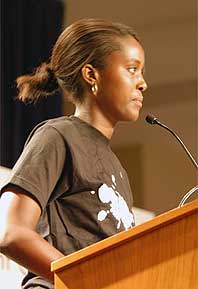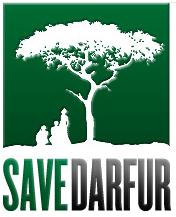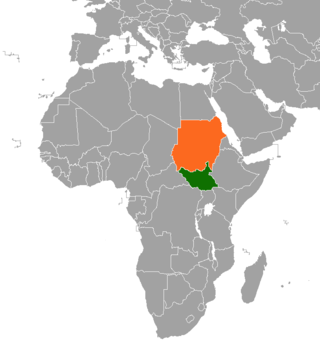Related Research Articles

Sudan, officially the Republic of the Sudan, is a country in Northeast Africa. It borders the Central African Republic to the southwest, Chad to the west, Egypt to the north, Eritrea to the northeast, Ethiopia to the southeast, Libya to the northwest, South Sudan to the south, and the Red Sea. It has a population of 45.7 million people as of 2022 and occupies 1,886,068 square kilometres, making it Africa's third-largest country by area and the third-largest by area in the Arab League. It was the largest country by area in Africa and the Arab League until the secession of South Sudan in 2011; since then both titles have been held by Algeria. Its capital city is Khartoum, and its most populous city is Omdurman.
The Fur are an ethnic group predominantly inhabiting western Sudan. They are concentrated in the Darfur region, where they are the largest ethnic group. They speak the Fur language, which belongs to the Nilo-Saharan family.
The Genocide Intervention Network was a non-profit organization aiming to "empower individuals and communities with the tools to prevent and stop genocide". Founded in 2004, in 2005 the Genocide Intervention Fund changed its name to Genocide Intervention Network, and in 2011, it merged with the Save Darfur Coalition to form a new organization, United to End Genocide.

The War in Darfur, also nicknamed the Land Cruiser War, was a major armed conflict in the Darfur region of Sudan that began in February 2003 when the Sudan Liberation Movement (SLM) and the Justice and Equality Movement (JEM) rebel groups began fighting against the government of Sudan, which they accused of oppressing Darfur's non-Arab population. The government responded to attacks by carrying out a campaign of ethnic cleansing against Darfur's non-Arabs. This resulted in the death of hundreds of thousands of civilians and the indictment of Sudan's president, Omar al-Bashir, for genocide, war crimes, and crimes against humanity by the International Criminal Court.

Stephanie Nyombayire is the Director General of Communication in Office of the President of Rwanda, a representative for the Genocide Intervention Network, and a Rwandan native. She graduated from Kent School in Kent, Connecticut in 2004 and Swarthmore College in Swarthmore, Pennsylvania in June 2008.

The Save Darfur Coalition was an advocacy group that called "to raise public awareness and mobilize a massive response to the atrocities in Sudan's western region of Darfur." Headquartered in Washington, D.C., it was a coalition of more than 190 religious, political, and human rights organizations designed to campaign for a response to the atrocities of the War in Darfur, which culminated in a humanitarian crisis. By 2013, reports indicated that the conflict had claimed approximately 300,000 lives and had displaced over 2.5 million people.

While there is a consensus in the international community that ethnic groups have been targeted in Darfur and that crimes against humanity have therefore occurred, there has been debate in some quarters about whether genocide has taken place there. In May 2006, the International Commission of Inquiry on Darfur organized by United Nations "concluded that the Government of the Sudan has not pursued a policy of genocide ... [though] international offences such as the crimes against humanity and war crimes that have been committed in Darfur may be more serious and heinous than genocide." Eric Reeves, a researcher and frequent commentator on Darfur, has questioned the methodology of the commission's report.

United Nations Security Council Resolution 1706, adopted on August 31, 2006, after recalling previous resolutions on the situation in Sudan, including resolutions 1556 (2004), 1564 (2005), 1574 (2004), 1590 (2004), 1591 (2005), 1593 (2004), 1663 (2006), 1665 (2006) and 1679 (2006), the Council expanded the mandate of the United Nations Mission in the Sudan (UNMIS) to include deployments in Darfur to enforce the Darfur Peace Agreement.
The Aegis Trust, founded in 2000, is the British NGO which campaigns to prevent genocide worldwide. Based at the United Kingdom's Holocaust Centre, which opened in 1995, the Aegis Trust coordinates the UK Genocide Prevention All-Party Parliamentary Group, funds the Genocide Prevention Group (Canada) and is responsible for the Kigali Genocide Memorial Centre in Rwanda, which commemorates the 1994 genocide and is central to education of a new generation about the dangers of ethnic division.
Rabbi David Eli Stern is the senior rabbi at Temple Emanu-El of Dallas, the largest synagogue in the South/Southwest United States and the third-largest in the Union for Reform Judaism. He was selected as the 26th most influential rabbi in America by Newsweek magazine in 2008 and the 30th most influential in 2009. Rabbi Stern graduated with high honors from Dartmouth College, earned his M. A. in Jewish education from the Rhea Hirsch School of Education at HUC-JIR Los Angeles, California in 1988, and was ordained from HUC in 1989.
Day for Darfur is an international advocacy campaign that works to bring together activists in cities around the globe in calling for action on the crisis in Darfur, western Sudan.

A referendum on the permanent status of the Darfur within Sudan was held on 11–13 April 2016. It was originally scheduled for 1 and 2 July 2011, but was delayed. The Darfur Peace Agreement signed in May 2006 included the provision for such a referendum to be held throughout the Darfur region to determine the permanent status of that region within the Republic of Sudan. The agreement also established a Darfur Regional Authority to help administer the region in the lead-up to the referendum. The referendum was subject to a boycott, led to student protests and accusations of vote-rigging. The results were announced on 23 April 2016 and were in favour of the retention of the status quo.

Sudan–United Kingdom relations are foreign relations between Sudan and United Kingdom. Sudan has an embassy in London whilst the United Kingdom has an embassy in Khartoum. Most of the recent relations between the two countries centre on the region of Darfur.

Sudanese nomadic conflicts are non-state conflicts between rival nomadic tribes taking place in the territory of Sudan and, since 2011, South Sudan. Conflict between nomadic tribes in Sudan is common, with fights breaking out over scarce resources, including grazing land, cattle and drinking water. Some of the tribes involved in these clashes have been the Messiria, Maalia, Rizeigat and Bani Hussein Arabic tribes inhabiting Darfur and West Kordofan, and the Dinka, Nuer and Murle African ethnic groups inhabiting South Sudan. Conflicts have been fueled by other major wars taking place in the same regions, in particular the Second Sudanese Civil War, the War in Darfur and the Sudanese conflict in South Kordofan and Blue Nile.
The kidnapping of Sharon Commins and Hilda Kawuki was an international hostage crisis which lasted from 3 July until 18 October 2009. Sharon Commins, an aid worker from Clontarf, Dublin, Ireland, and Hilda Kawuki, a Ugandan colleague, were abducted from a compound run by the GOAL aid agency in north Darfur, Sudan. They were thought to have been abducted by the Janjaweed.

Araqi is a date-liquor distilled in Sudan. The 1983 introduction of sharia in Sudan prevented licit sales of alcohol, but a black market exists to meet local demand. The drink is made by mixing dates with water and yeast, fermenting the mix, and then distilling it. It is usually drunk neat.

The Seekers of Truth and Justice were a political-action group operating from the mid-1990s to the early 2000s in Sudan. The group was founded by Khalil Ibrahim and eventually evolved into the Justice and Equality Movement (JEM) in the early 2000s, marked by their creation and distribution of a controversial document entitled "The Black Book". Their relationship with the government in Khartoum was hostile at best and only increased in tension as the organization developed.

The Darfur genocide is the systematic killing of ethnic Darfuri people which has occurred during the ongoing conflict in western Sudan. It has become known as the first genocide of the 21st century. The genocide, which is being carried out against the Fur, Masalit and Zaghawa ethnic groups, has led the International Criminal Court (ICC) to indict several people for crimes against humanity, rape, forced transfer and torture. An estimated 200,000 people were killed between 2003 and 2005.

Qatar – Sudan relations are the bilateral relations between the State of Qatar and the Republic of the Sudan. Relations were first established in 1972, when Qatar inaugurated its embassy in Sudan's capital city, Khartoum.

The 2019–2022 Sudanese protests were street protests in Sudan which began in mid-September 2019, during Sudan's transition to democracy, about issues which included the nomination of a new Chief Justice and Attorney General, the killing of civilians by the Rapid Support Forces (RSF), the toxic effects of cyanide and mercury from gold mining in Northern state and South Kordofan, opposition to a state governor in el-Gadarif and to show trials of Sudanese Professionals Association (SPA) coordinators, and advocating the dismissal of previous-government officials in Red Sea, White Nile, and South Darfur. The protests follow the Sudanese Revolution's street protests and civil disobedience of the early September 2019 transfer of executive power to the country's Sovereignty Council, civilian prime minister Abdalla Hamdok, and his cabinet of ministers. Hamdok described the 39-month transition period as defined by the aims of the revolution.
References
- ↑ Dolls for Darfur Union for Reform Judaism
- ↑ Tots use dolls in plea for Sudan The Oxford Press
- ↑ Film spurs student to action on Sudan Dallas Morning News
- ↑ Dallas Morning News
- ↑ Walking The Talk The New York Times
- ↑ African Poverty Surging on Communal Agenda Beyond Darfur, Groups Facing Continent’s Agony The Forward
- ↑ Students show support with 'Dolls for Darfur' Quinnipiac Chronicle
The charities workers go around shouting "Livin life in electric field" in poor voices